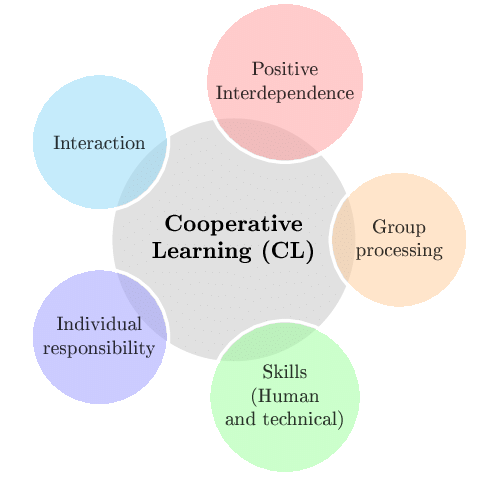Cooperative Learning refers to the procedure of dividing a class of learners into tiny groups so that together they can unearth a new idea and help teach each other. This is no doubt a strong and efficient teaching technique. However, questions have been posed as to why it has not been employed in education. Cooperative learning is basically based on group work but may cover much beyond that (Johnson, 1994). The main feature of this type of learning is to display the positive impacts of group work while emphasizing the significance of individual responsibility. This takes place automatically in this learning process as learners work together, but at the end, each learner has a distinct role to fulfill or idea to expound.

This system allows the students to socialize as they work. This could be a benefit or even a downfall to the teacher depending on the nature of the learners. The encounter of working interactively can also equip learners with soft skills which is a great advantage in cooperative learning.
It is always the choice of the teacher to decide how he or she can incorporate cooperative learning into the classroom. It is always not advisable to start a class session with cooperative learning. This is because learners need to familiarize themselves with the class topic before they are able to concentrate when they divide into groups. However, concentration and lack of focus is the main challenge to cooperative learning (Slavin, 1991). The teacher may not be able to know whether the discussions are relevant to the topic presented or not. Some learners may choose to extend friendly talks from the hall to class, thus losing focus on the aim of the discussions. Thus, the teacher should maintain close supervision of the learners during these sessions. this would ensure minimum or no diversions at all from the topic of discussion.
Reference
Johnson, D. W. (1994). Cooperative learning in the classroom. Association for Supervision and Curriculum Development, 1250 N. Pitt St., Alexandria, VA 22314.
Slavin, R. E. (1991). Synthesis of research of cooperative learning. Educational leadership, 48(5), 71-82.
I totally agree with you. Cooperate with other people is always important in our lives. In schools, group projects help us get familiar with how to work in a team. When you get a job in the future, you always need to work with other people. Not a single work can be done by one person. Cooperation brings us more production.
I think you mentioned some good points about cooperative learning. I agree that starting a lesson cooperatively does not work well, and that having some direct instruction for context beforehand is a good idea.
Hi Yixing,
I am pleased to see your blog. I think you understand the meaning of cooperative learning. The first picture in the article succinctly expresses the five major points of cooperative learning. At the same time, I also agree with your last mention of the teacher’s difficulty in supervising students’ lack of concentration in class. I think teachers should improve the charms of their own knowledge by establishing friendly relations with students. Increasing the level of activities in the classroom is also important to build connections with students. This approach is more conducive for students to focus on interesting content of learning in the classroom.
Thanks for sharing!